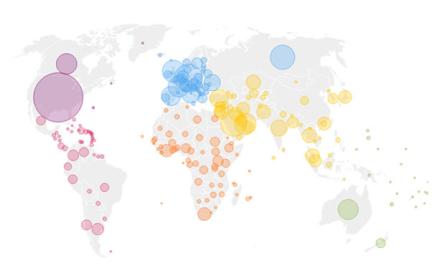-
Who we are
WHO WE AREThe International Organization for Migration (IOM) is part of the United Nations System as the leading inter-governmental organization promoting since 1951 humane and orderly migration for the benefit of all, with 175 member states and a presence in 171 countries.
-
Our Work
Our WorkAs the leading inter-governmental organization promoting since 1951 humane and orderly migration, IOM plays a key role to support the achievement of the 2030 Agenda through different areas of intervention that connect both humanitarian assistance and sustainable development.
What We Do
What We Do
Partnerships
Partnerships
- Where we work
-
Take Action
Take Action
Work with us
Work with us
Get involved
Get involved
- Data and Research
- 2030 Agenda
In recent years, conflict, insecurity, and the effects of climate change have heavily contributed to the forced movement of people whether within countries or across borders. Over 59 million were internally displaced by the end of 2021.
Regardless of the reasons that compel people to move, migrants and displaced people represent some of the most vulnerable and marginalized groups in society, and are often exposed to abuse and exploitation. They have limited access to essential services including health care, and are faced with xenophobic attacks and stigma fueled by misinformation. In addition, many migrant workers are often in temporary, informal, or unprotected jobs, which exposes them to a greater risk of insecurity, layoffs, and poor working conditions.
Due to persistent lack of safe and regular migration pathways, millions continue to take perilous journeys each year. Since 2014, more than 50,000 migrants have lost their lives on migratory routes across the world.
Despite this, migrants have proven to be a source of prosperity, innovation, and sustainable development to countries of origin and transit, and in host countries. Their financial contribution through remittances offers a lifeline to families and spur local markets, especially those of Low- and Middle-Income Countries. Their role in the labour market remains invaluable as evident on the frontline of the COVID-19 pandemic response. Their knowledge, networks, and skills have greatly contributed to the development of resilient communities.
Strengthening the contribution of migrants to sustainable development requires collective effort to improve the governance of migration and addressing the challenges migrants face. The Global Compact for Safe, Orderly and Regular Migration (GCM) offers the opportunity and guidance to actualize human mobility and seize the opportunities it presents.
On this International Migrants Day, and every day, IOM reaffirms its commitment to promoting a humane and orderly management of migration for the benefit of all, including the communities of origin, transit, and destination.
The Global Compact on Migration
The Global Compact on Migration is the first-ever intergovernmentally negotiated UN agreement on a common approach to international migration.


















